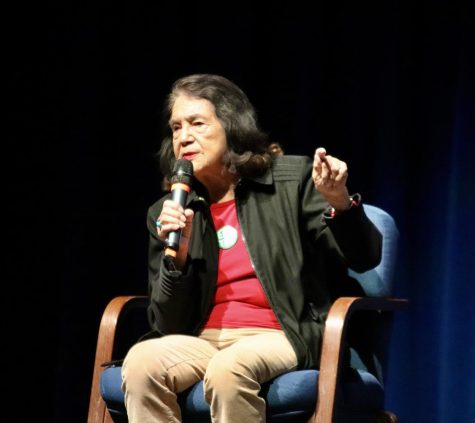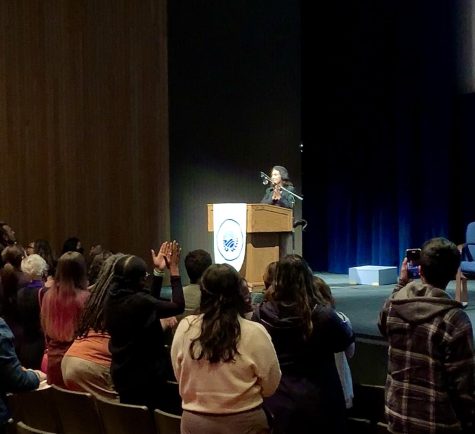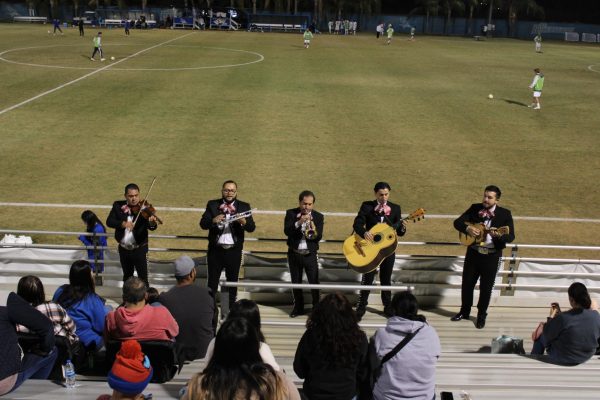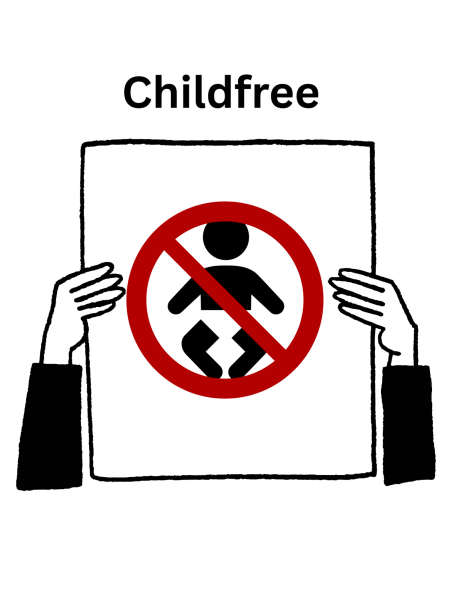18th annual KIE fall lecture features civil rights activist Dolores Huerta
November 6, 2022
 Activist and organizer Dolores Huerta spoke on Thursday, Nov. 3, at California State University, Bakersfield’s Dore Theatre. Huerta was invited to speak for the 18th Annual Kegley Institute of Ethics Fall Lecture. The title of her lecture was: “Leadership and Activism: How to Overcome Apathy and Find Your Power.”
Activist and organizer Dolores Huerta spoke on Thursday, Nov. 3, at California State University, Bakersfield’s Dore Theatre. Huerta was invited to speak for the 18th Annual Kegley Institute of Ethics Fall Lecture. The title of her lecture was: “Leadership and Activism: How to Overcome Apathy and Find Your Power.”
Huerta began the event saying she felt nervous speaking to the audience. But the nervousness must have vanished, as she left no subject untouched. Her lecture challenged white supremacy, sexism, and the oil business. Most importantly, she delivered a message of empowering the people and encouraged others to make the changes the community needs.

Huerta said, “When you are an organizer, it’s not about you, it’s about the people you empower.”
Huerta, who is now 92 years old, shared her wisdom from over 65 years of community activism. She discussed her early activism work with the Community Service Organization in the 1950s, the Delano Grape Strike of 1965, and the current work being done with the Dolores Huerta Foundation.
She said it was her early years of canvassing to register voters and organizing from a grassroots level that inspired the foundation and her work to this day.
Huerta said “Knocking on the doors is so important … it gives you emotional fortitude because when you’re talking to strangers and you’re trying to convince them to do something like registering to vote or to vote, it really takes a lot of psyche energy … and it’s kind of scary when you’re talking to people. But I have to say, that was the beginning of my activism. Going out there, knocking on doors, getting people to register to vote and getting people to vote.”
She acknowledged the hardships one faces, but with activism, “you focus your energy on what you’re trying to accomplish. And all those problems that we have, they are going to be taken care of one way or another … But the thing is you’re focusing on what you’re trying to do, on the change you’re trying to make … And that really helps a lot with your own personal problems.”
When speaking on apathy, she said many people feel like they do not have the power to make change, “but once they become activists, it changes.”
The opening speaker, CSUB alumni Connie Perez-Andreesen, was one of those people whose lives were changed when becoming an activist. She is chief administrator officer and National Vice President of the United Farm Workers.
Perez-Andreesen said, “Thank you, Dolores, for all the doors you have opened to make this possible. Dolores, I stand on your shoulders, my life and career are just a small part of your legacy. So, to those of you in the audience, I just want to say you are more connected to the history of our community than you think. And there is much to do here for the farm workers who feed us as ever. Don’t let tonight be a history lesson, get involved, vote next Tuesday … and encourage others to vote.”

Huerta also encouraged the audience to get involved. Members of the foundation were available to sign up volunteers and offered resources, such as COVID testing kits, at the theatre.
Lori Pesante, civic engagement and government relations director for the Dolores Huerta Foundation, said that the “mission is to inspire and organize communities to create volunteer organizations to fight for social justice.”
Pesante revealed that the foundation will be celebrating its 20th anniversary next year. She said having a local grassroots organization is important. As an example of the work they do, she mentioned how the citizens of Weedpatch were being charged for streetlights, when they had no streetlights on their street. The foundation was able to advocate for that community and have done the same for many others.
Pesante shared, “there is a segment of our population that has no idea that stuff is happening all over the valley. And we are part of making sure that people see they don’t have to live with that. They don’t have to be satisfied with the status quo. That they have every right to be at the table and to not be on the menu.”
As for the lecture, Pesante said, “I think it is extremely important all the issues that she’s raising, in particular the comments Dolores made about our energy transition.”
Pesante is referring to Huerta speaking about her concern with carbon sequestration, a questionable method on reducing climate change.
“It’s extremely important,” said Pesante. “We cannot allow the same folks who have engaged in the environmental racism of 150 to 200 years to be the same people who are the only people making the decisions for the next hundred.”
Huerta’s message echoed the same sentiment throughout, reminding us all that “we are one human race.”
“The only way we survived on this planet is because we took care of each other,” said Huerta. “We supported each other, we protected each other, we shared whatever we had with each other. And that’s how we survived.”






